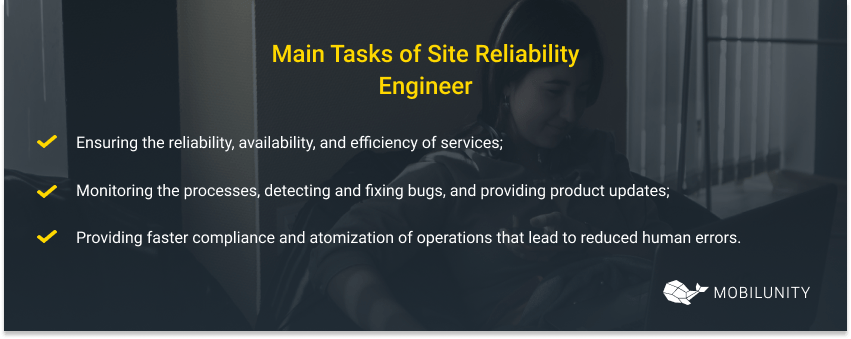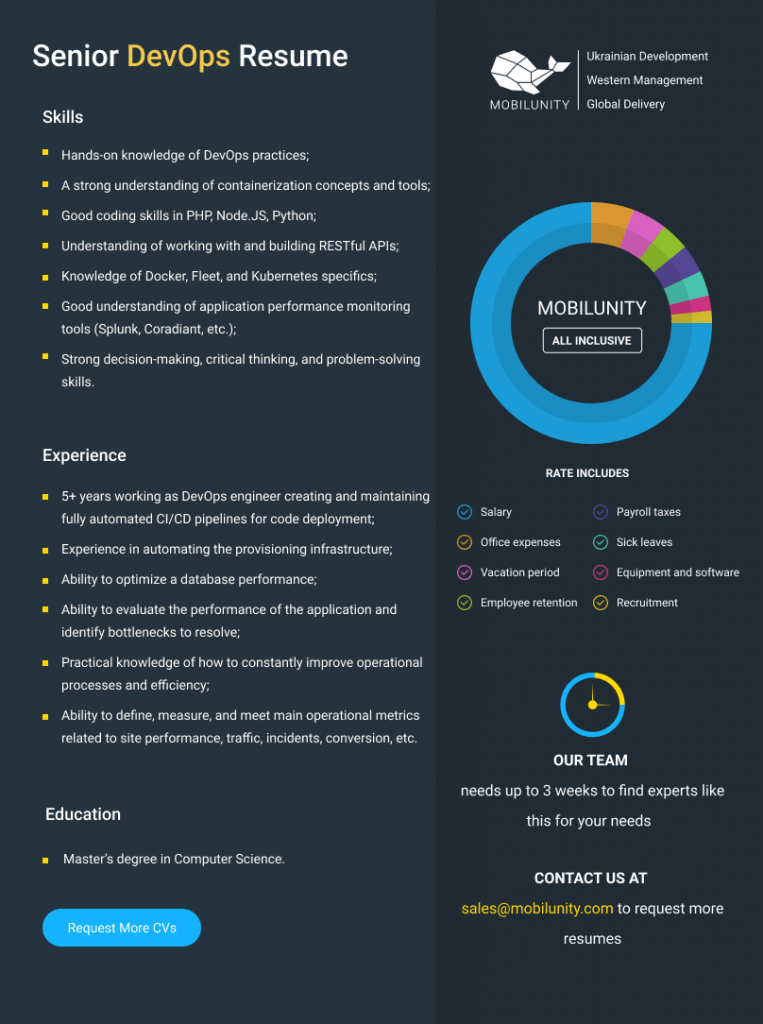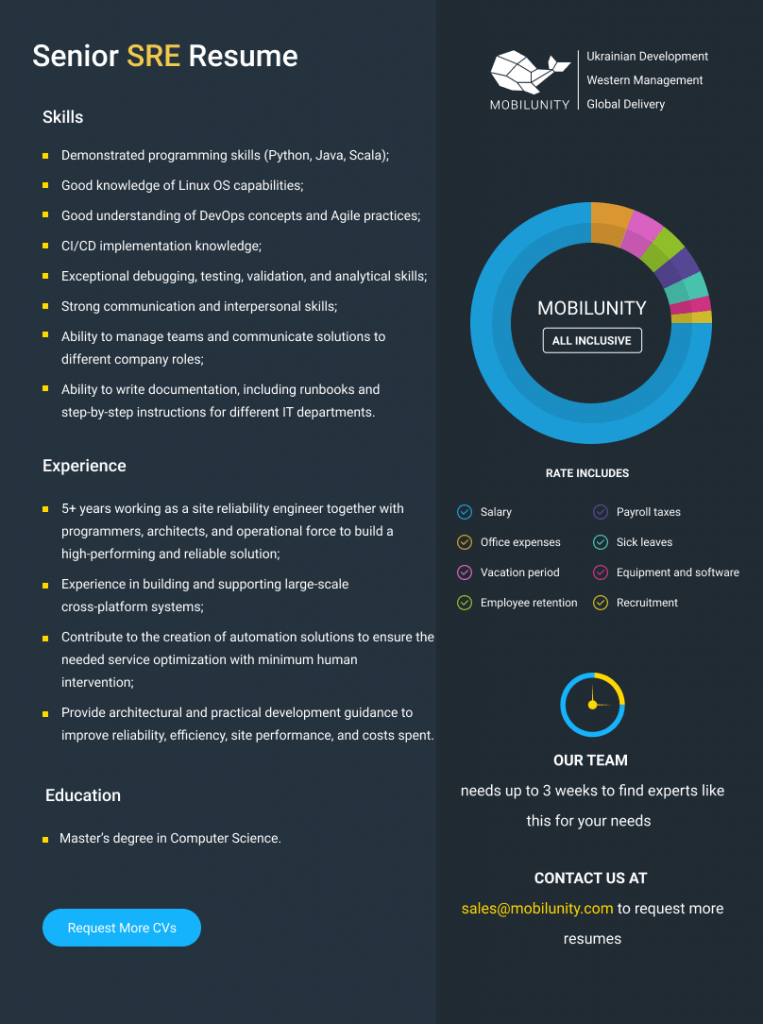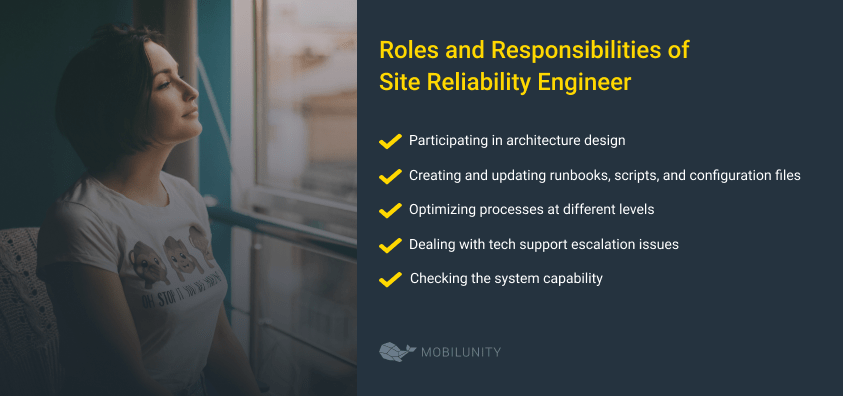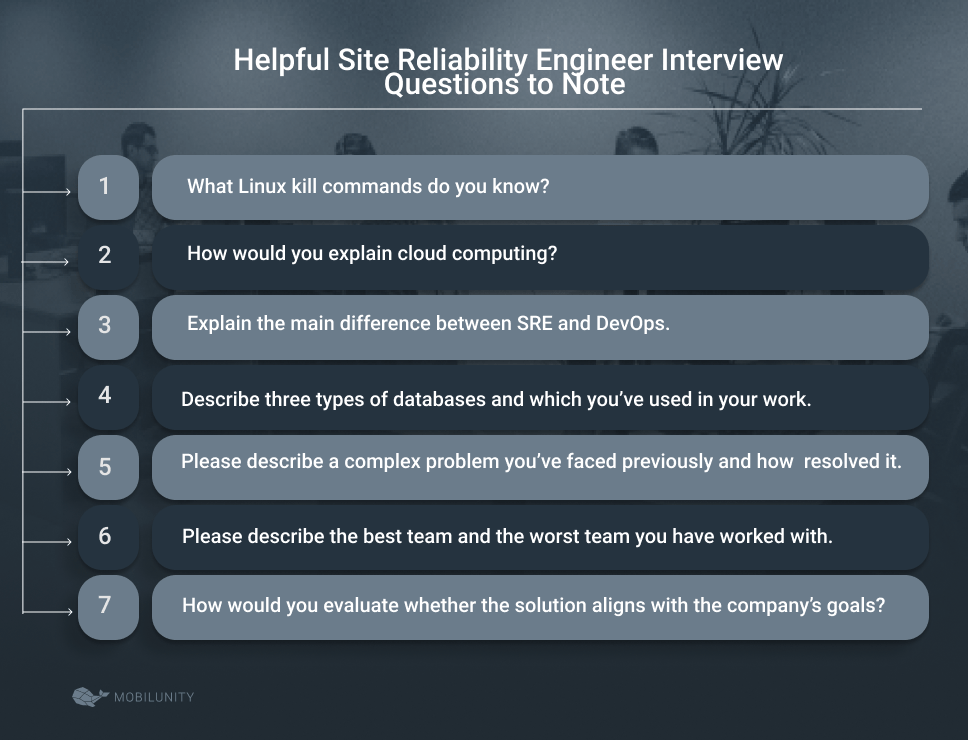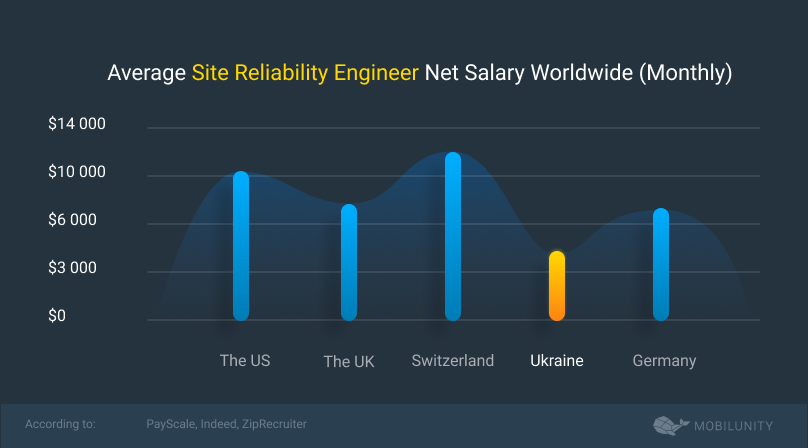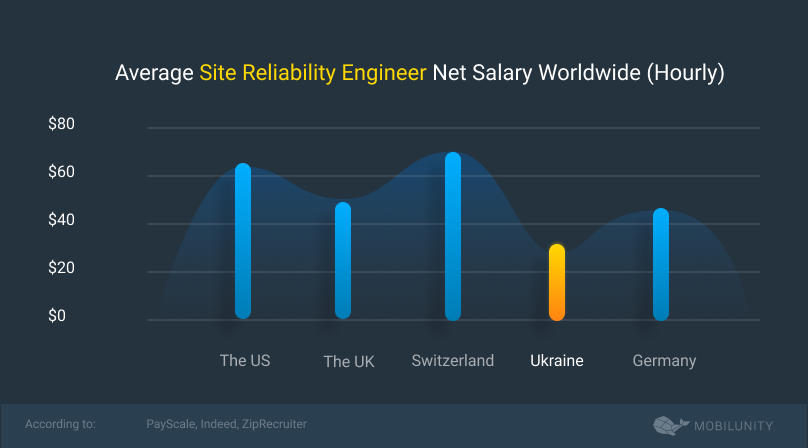Hire a Site Reliability Engineer in Ukraine
- What Is Site Reliability Engineering (SRE)?
- Site Reliability Engineer vs DevOps: Similarities and Differences
- Roles and Responsibilities of a Site Reliability Engineer
- Helpful Site Reliability Engineer Interview Questions to Note
- Pros & Cons of Hiring an SRE Specialist
- SRE: Permanent Employment vs Part-Time Consultancy
- Comparing Site Reliability Engineer Salaries in Different Countries
- Hiring SRE Experts Locally vs Remote
- Why Hire a Site Reliability Engineer in Ukraine
- Mobilunity – Reliable IT Team Extension Provider in Ukraine
In the past two years, a site reliability engineer role has been widely discussed, and many SMBs and large-scale organizations already have SREs among IT experts hired. What are the duties and responsibilities of a site reliability engineer, what are the main points of SRE vs DevOps, and how to recruit the best SRE expert for your business? We discuss these and more below.
What Is Site Reliability Engineering (SRE)?
Site reliability engineering (SRE) is a systematic approach to the analysis and support of a platform or system. The main goal of the expert is to ensure the reliability, availability, and efficiency of services. SRE is responsible for change management, monitoring, incident response, and performance of its services.
A site reliability engineer position is usually inherent to large-scale corporations that create large-scale applications and complex solutions and which processes are associated with multi-tier systems and complex architectures. It may be a separate job position and a methodology utilized by the IT department in general.
The main tasks of an SRE expert include:
- Ensuring the reliability, availability, and efficiency of services;
- Monitoring the processes, detecting and fixing bugs, and providing product updates;
- Providing faster compliance and atomization of operations that lead to reduced human errors.
Simply put, an SRE engineer is a developer within the IT organization that can be considered an advanced QA expert in charge of anything from monitoring and analyzing to implementing code changes in production to improve system stability and performance.
Site Reliability Engineer vs DevOps: Similarities and Differences
Site reliability engineering is a fairly new direction in which development processes and DevOps practices are closely intertwined. It is not surprising that SRE and DevOps are often confused with each other, as SRE arose from Google’s VP approach to DevOps. After the pioneering approach described by Ben Trainor, site reliability engineering has become more widespread and in-demand among companies worldwide. Let’s take a look at the similar and different points of DevOps and SRE:
| DevOps | SRE |
| DevOps is a set of tools designed to bridge the gap between software development and operation and does not contain concise instructions for achieving success. | SRE implements the DevOps philosophy and has a much broader set of conditions for assessing the quality interaction between developers and the operations department. |
| DevOps mainly concentrates on the “what” part of system analysis. | SRE looks deeper into the “how” aspect of tackling the issue to provide detailed steps to ensure success. |
| DevOps reorganizes and assesses already embedded options. | SRE controls the entire stack and can apply fixes if needed or build a tool that can fix the issue without human intervention. |
| DevOps engineers mostly work with cloud services and write scripts to automate work. | SRE developers not only write code but also monitor how it performs in production. |
| DevOps specialists aim to ensure the optimal automatization of the application lifecycle. | Site reliability engineers are responsible for the stable operation of the workflows or infrastructure. |
In simple terms, DevOps evaluates issues related to software monitoring and maintenance processes, whereas an SRE engineer goes beyond analytics and provides actual solutions to the identified issues. Yet, when talking about a site reliability engineer vs software engineer, an SRE expert can be considered more of an advanced QA specialist than a full-fledged software developer.
Below you can find a Senior DevOps resume and a Senior site reliability engineer resume to compare DevOps vs site reliability engineer:
Senior DevOps Resume Sample:
Senior Site Reliability Engineer Resume Sample:
Roles and Responsibilities of a Site Reliability Engineer
In general, a service reliability engineer assesses the system, detects bugs, and provides solutions on how to fix them and enhance the reliability of the system. The full scope of the site reliability engineer responsibilities can vary, depending on the company’s needs and specifics, but the main duties usually include:
- Participating in architecture design. SRE specialists should have a deep understanding of the servers used by the company, their capacity, configuration, and technical limitations. This knowledge allows them to assess the workflows, identify real and potential problems, and proceed accordingly.
- Creating and updating runbooks, scripts, and configuration files. Senior site reliability engineers create and maintain documentation, which contains step-by-step guidelines that should be used to check the system in case of a failure, reproduce settings on other servers and reduce the likelihood of errors. This helps to avoid infrastructure downtime and financial losses for the company.
- Optimizing processes at different levels. An SRE expert should analyze the structure of the data center, in addition to writing code at different levels of the technology stack.
- Dealing with tech support escalation issues. Such an expert may also be responsible for the implementation of systems that help operational work and support. They may handle escalated tickets related to technical errors and bugs to help to identify the current critical errors in the system and fix them accordingly.
- Checking the system capability. An SRE specialist may be in charge of checking and monitoring to ensure that the system is loaded optimally and no extra money is not spent on its operation. An SRE engineer can analyze the potential growth of services, as well as the optimal power for the future system.
To sum up, an SRE expert actively participates in every stage of the company’s development processes. They help to catch and avoid errors on each step and build a well-structured system that will perform effectively. Here are the three stages of how the SRE’s workflow goes:
| Stage 1 – Design | Stage 2 – Implementation | Stage 3 – Maintenance |
| An SRE expert consults the teams, analyzes and plans the future software, creates a well-thought infrastructure. They can determine the capacity of servers and their technical limitations, and the criteria that programmers must fulfill. | An SRE specialist comes up with a toolset and guidelines for the implementation of the solution. They may write code scripts and configuration files to help automate the system and reduce the possibility of human errors. | An SRE expert monitors the performance of the solutions and makes adjustments if needed. They evaluate the stability and performance of applications and can provide specific instructions on fixing/improving the solution. |
Helpful Site Reliability Engineer Interview Questions to Note
The list of requirements for site reliability experts varies and largely depends on the company’s need and focus. Here are vital areas of expertise to check when evaluating an SRE candidate:
- Knowledge of Linux OS: “What Linux kill commands do you know?”
- Cloud engineer knowledge: “How would you explain cloud computing?”
- DevOps vs. SRE: “Explain the main difference between SRE and DevOps.”
- Hard skills: “Explain virtualization, containers, and Kubernetes,” “Describe three types of databases and which you’ve used in your work,” “Name common architecture bottlenecks and how these can be mitigated.”
- Analytical thinking & problem-solving attitude: “Please describe a complex problem you’ve faced previously and how you processed to resolve it step by step.”
- Soft skills: “Please describe the best team and the worst team you have worked with,” “Describe your approach in managing a remote team.”
- Business analysis: “How would you evaluate whether the potential solution aligns with the company’s goals?”
A seasoned site reliability engineer should know Linux specifics (be able to understand logs and the processor load), use monitoring (Nagios, Zabbix, Prometheus, etc.) and logging systems (Splunk, ELK, etc.), and be able to write code using high-level development languages (Java, C#, C++, Python, etc.)
Pros & Cons of Hiring an SRE Specialist
As it was previously stated, SRE is closely related to business operations and helps to avoid critical issues within the infrastructure, decrease the downtime for the application, optimize workflows, and minimize customers’ complaints. This leads to the minimization of costs for the company and provides stability and progress for the overall development. Let’s summarize the advantages and disadvantages of hiring an SRE expert for business:
| Pros | Cons |
| An SRE expert can help to automate processes and save time on doing tasks. SRE allows managing a large number of projects and creating an infrastructure that ensures all applications work stable and efficiently. | SRE may not be relevant for small organizations with low traffic on projects, and the site engineer duties can be handled by a tech support person, system administrator, dedicated devops developers or consultant. |
| An SRE specialist can help the business to minimize the costs of software development. | Finding an experienced site reliability engineer with the needed skillset and expertise may be time-consuming and costly. Besides, an SRE specialist will need a considerable amount of time to assess the existing system before implementing any changes. |
| An experienced SRE expert knows how to reduce the communication struggles within development and operation processes, building an integrated communication channel and well-organized communication processes between teams. | It may be hard to integrate a newly hired SRE expert into the existing and established teams and structures that follow conservative approaches and do not welcome changes. However, experienced site reliability engineers know how to handle such situations. |
| It’s possible to select the suitable SRE model for your company: centralized SRE, on-call SRE, embedded SRE, etc. You also can enhance your infrastructure without a full-time SRE expert by opting for SRE consultancy when needed. |
SRE will definitely not be able to replace your operational team, but it can serve as a key link between software development and IT operations. For companies in need of a well-built infrastructure and automated workflows, SRE services are worth implementing. Whether it is a large-scale organization with complex projects or a small company in need of expert consultancy, SRE can deliver much-needed value to the IT processes.
SRE: Permanent Employment vs Part-Time Consultancy
Depending on the scale of the business, its organization structure, and other specifics, a company may choose to hire an SRE expert full-time (permanent employment) or part-time (consultancy/development services on-demand).
For large-scale organizations that produce complex solutions, it’s more common and reasonable to hire an expert or a team full-time. For small companies or not loaded with traffic projects, part-time SRE consultancy could be enough to help the organization optimize its continuous delivery processes and achieve desirable results, which also allows reducing costs associated with SRE services.
Permanent employment can be a perfect choice for:
- Companies with two or more development teams that need a solid infrastructure team for optimization;
- Companies with several services in development, where the demand and scope can potentially outgrow into a perplexing and demanding system that will be hard to tackle without a dedicated SRE team;
- Companies with frequent software/update releases have difficulties with monitoring and fixing existing issues and assessing the systems to avoid potential pitfalls.
Part-time consultancy may be beneficial for:
- Organizations that need short-term consulting ranging from a couple of hours to project-based solutions;
- Companies in need of a quick solution to an issue that in-house experts cannot resolve;
- Small companies that need long-term support and consulting but don’t require daily checkups of continuous process optimization;
- Businesses that need to adapt tools or infrastructure for a new/additional/complex project.
Comparing Site Reliability Engineer Salaries in Different Countries
The average salary of an SRE expert can vary significantly, depending on the professional’s experience, expertise, and location. Below, you can find a comparison table with site reliability engineer salary rates (monthly and hourly) in different countries, based on ZipRecruiter, Indeed, and Payscale data, as well as our Recruiting Team research over several local job portals:
| The US | The UK | Switzerland | Germany | Ukraine | |
| Monthly rates | $10,835 | $8,130 | $11,136 | $6,910 | $4,500* |
| Hourly rates | $63/hour | $51/hour | $70/hour | $44/hour | $30* |
* Ukrainian rates are based on the data of our internal Recruiting Team
As you can see, given the same level of knowledge and experience, SRE specialists earn differently as per their place of living. More affordable remote site reliability engineer salary rates are among the top reasons why many businesses choose to hire dedicated DevOps engineers and SRE experts instead of recruiting local engineers in-house.
Hiring SRE Experts Locally vs Remote
In the current realities with many people working from their homes, and given the well-developed communication means we have nowadays, there is no more large discrepancy in specifics and, what’s more, efficiency between working in-house or remotely. However, depending on the organizational structure and the scale of the company, as well as its specifics, a business may benefit more from a specific working method.
When searching for a site reliability expert locally, you receive:
- Access to the talent pool limited by the city/region;
- A highly competitive market with the majority of SRE specialists already working at companies;
- This leads to the need of offering higher-than-market compensation, including material and non-material perks;
- A big plus is having a site reliability engineer at hand for real-time communication and swift change/update implementation.
When opting for a site reliability engineer remote, you get:
- Access to the global IT talent pool;
- Access to global knowledge, expertise, best practices, and latest approaches;
- Possibility to find an SRE specialist with the most relevant experience in your field/industry;
- Possibility to work with a top-level SRE consultant on-demand and pay for their services and results (and not their presence in the office).
- More affordable salary rates and a possibility to pay for the assistance/consultancy only when requesting specific services.
- Possibility to discuss working hours and agree on communication/reporting means for the convenience of both parties.
Why Hire a Site Reliability Engineer in Ukraine
Choosing the right outsourcing destination may be a daunting task, and hiring even one expert remotely may be no easier. Here’s why it could be beneficial to pay attention to Ukrainian site reliability engineers for hire:
- The largest IT talent pool in Europe (200,000+ IT experts, as per TechUkraine)
- Well-educated labor force (400,000+ graduates annually, according to the KPMG report)
- Flexible employment regulation, low wages, and favorable tax systems for foreign businesses;
- Affordable rates;
- High command of English (and other European languages, such as German, French, and Spanish);
- Convenient geographical location and time zone for businesses with headquarters in Western Europe and the US;
- Cultural similarities and shared values with European countries.
Mobilunity – Reliable IT Team Extension Provider in Ukraine
Mobilunity is a reputable Ukrainian dedicated dev team vendor with 10+ years of operating on the global IT market. We help small startups to large-scale organizations to build and manage dedicated development teams and IT resources with our first-class outsourcing and staff augmentation solutions.
The seasoned Recruitment Team knows how to source and recruit the best candidates as per the business requirements, and we at Mobilunity combine the best industry practices with our own time-tested recruiting solutions. Our clients’ feedback mentions the professionalism, tailored solutions, and dedicated approach as one of the biggest Mobilunity experts’ strengths.
Should you need a Senior site reliability engineer or any other top-level IT expert, you can rely on Mobilunity solutions. Get in touch with our representative today, and let us help you find the perfect SRE specialist for your organization.

